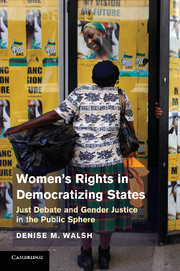Book contents
- Frontmatter
- Contents
- List of Figures and Tables
- Acknowledgments
- Abbreviations
- PART I JUST DEBATE
- PART II JUST DEBATE IN DEMOCRATIZING STATES
- 4 Just Debate Denied: Socialist and Post-socialist Poland
- 5 Just Debate Diverges: Regime Breakdown in Chile and South Africa
- 6 Just Debate Prevails: The Liberal Moment in South Africa
- 7 Just Debate Declines: Consolidation in South Africa
- PART III GENDER JUSTICE
- Bibliography
- Index
4 - Just Debate Denied: Socialist and Post-socialist Poland
Published online by Cambridge University Press: 06 December 2010
- Frontmatter
- Contents
- List of Figures and Tables
- Acknowledgments
- Abbreviations
- PART I JUST DEBATE
- PART II JUST DEBATE IN DEMOCRATIZING STATES
- 4 Just Debate Denied: Socialist and Post-socialist Poland
- 5 Just Debate Diverges: Regime Breakdown in Chile and South Africa
- 6 Just Debate Prevails: The Liberal Moment in South Africa
- 7 Just Debate Declines: Consolidation in South Africa
- PART III GENDER JUSTICE
- Bibliography
- Index
Summary
“There are equal, and more equal.”
Polish proverbINTRODUCTION
Democratic transitions in Central and Eastern Europe have been associated with limited advances in gender justice. Although scholars do not deny women's valuable gains in civil and political rights in this region, most agree that the price women paid for those rights was high (e.g., Fodor 2009; Heinen and Portet 2002; Titkow 1998). This high price has been evident even in countries where the democratic transition was the smoothest and most successful: Hungary, the Czech Republic, and Poland. Analysts agree that women's rights eroded precipitously with the transition to democracy in Poland, pointing to an immediate decline in the number of women in politics, dramatically high unemployment rates, decreases in women's family benefits, and an end to legalized abortion (Hardy, Kozek, and Stenning 2008; Heinen and Portet 2002; Simienska 1998). Democratization in Poland appears to have been accompanied by a backlash against women's rights.
As discussed in Chapter 3, scholars have offered several persuasive explanations for this retrenchment, including a lack of women's organizing and an alliance between Solidarity and the conservative Polish Roman Catholic Church. That means an analysis of just debate in Poland cannot prove the causal salience of my hypothesis, as it must compete on an equal footing with these alternative arguments. However, an analysis of debate conditions in Poland can reveal whether the just debate approach is plausible when democratization and such poor outcomes on women's rights occur in tandem.
- Type
- Chapter
- Information
- Women’s Rights in Democratizing StatesJust Debate and Gender Justice in the Public Sphere, pp. 79 - 117Publisher: Cambridge University PressPrint publication year: 2010



